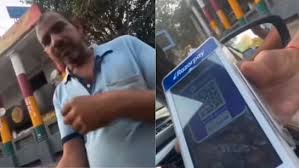
Delhi's QR Code Parking Scam: What You Need to Know
A viral video circulating on social media has raised significant concerns regarding a potential QR-code parking scam linked to the Municipal Corporation of Delhi (MCD). The footage shows a man collecting parking fees using a Razorpay point-of-sale (POS) machine, but suspiciously displays a PhonePe QR code on the screen. This discrepancy raised alarms among vehicle owners who were recording the incident.
In the video, the driver repeatedly questions the attendant about the Razorpay machine showing a PhonePe QR code. The attendant struggles to provide a clear explanation while insisting on payment. Upon scanning the QR code, it becomes evident that the payment is directed to an individual named Vinod Kumar, rather than the MCD. This revelation leads the vehicle owners to refuse payment, pointing out that a municipal parking lot should not redirect funds to a private person.
The attendant then claims to be Vinod Kumar and insists that the “thekadar” (contractor) is authorized to collect fees on behalf of the MCD. This claim only deepens the confusion and controversy surrounding the situation.
The viral video has prompted a wave of reactions online. Some users pointed out that MCD parking receipts often do not display the municipal name, instead showing the contractor’s details. Users from other cities, like Mumbai, commented that similar contractor-based systems are in place there as well.
The odd pairing of a different QR code appearing on a third-party POS device has raised legitimate concerns about misdirected payments and the potential for scams targeting unsuspecting users. This incident has caught the attention of key fintech leaders, including Razorpay founder Shashank Kumar, who stated that the company would disable unnecessary gallery access in an upcoming software update. Many believe this feature could be exploited by scammers to insert fraudulent QR codes into machines.
While some praised Razorpay's swift response, others expressed concern that scammers might not update their devices, leaving loopholes for fraud to persist. Paytm founder Vijay Shekhar Sharma also chimed in, highlighting that Paytm’s soundbox feature can help prevent such offline scams by audibly confirming the recipient’s name after payment. His comments led to light-hearted jokes about product promotion and comparisons between Paytm's safety features and Razorpay's systems.
This viral clip serves as a crucial reminder that QR-based fraud is evolving, and even routine transactions, such as parking fees, require a level of caution. Vehicle owners should always verify the merchant’s name after scanning, request printed receipts, and confirm whether the parking lot is genuinely MCD-authorized. The ongoing discussion surrounding this incident emphasizes the need for better contractor transparency, improved payment safety measures, and stricter monitoring by city authorities regarding parking fee collections.









